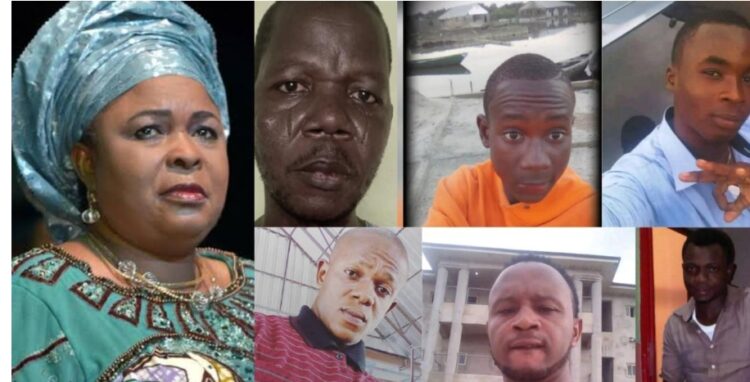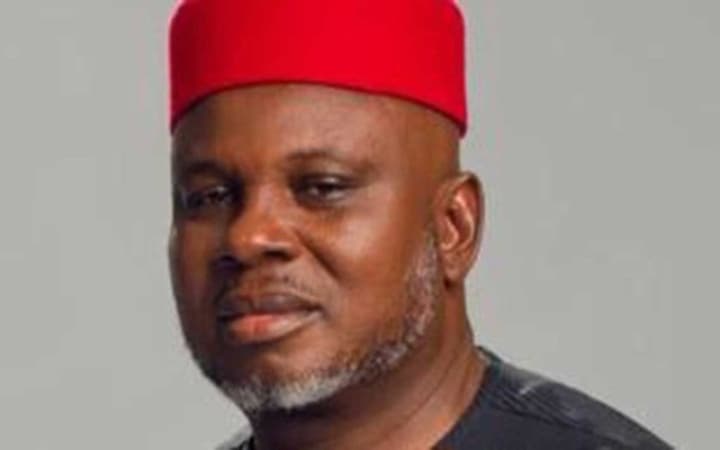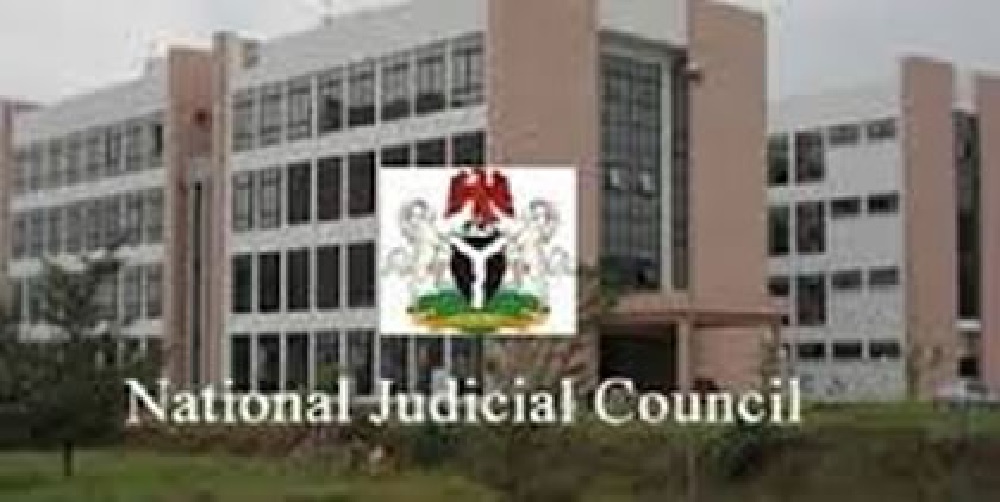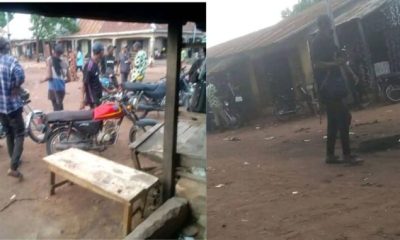News
Inferior fuel: FG demands Dangote refinery’s diesel report, orders new test

The Federal Government, through the Nigerian Midstream and Downstream Petroleum Regulatory Authority, is expecting fresh reports to confirm the real sulphur content of the diesel produced by the Dangote refinery as the company debunked claims of inferior fuel production.
The NMDPRA spokesman, George Ene-Ita, in an interview with The PUNCH on Sunday, said the agency had done its job and would not engage in a media fight with anybody over the claims made by the NMDPRA Chief Executive, Farouk Ahmed, that Dangote’s diesel has more sulphur content than imported one.
According to Ene-Ita, the authority has about 15 engineers and scientists embedded in the Dangote refinery, whose fresh report about the refinery’s sulphur content will be out on Monday (today).
The PUNCH reported Ahmed as alleging that the diesel from the Dangote refinery contains high sulphur content.
Reacting to Dangote’s allegations that the NMDPRA was giving licences to some traders to import dirty fuel into Nigeria last week, Ahmed argued that it was the Dangote fuel that had a larger content of sulphur.
He also said the refinery, which has been selling diesel and aviation fuel in Nigeria for months, had yet to be licensed, stating that it was still at the pre-commissioning stage.
“The claim by some media houses that there were steps to scuttle the Dangote refinery is not so. The Dangote refinery is still in the pre-commissioning stage. It has not been licensed yet; we haven’t licensed them yet. They are still in the pre-commissioning. I think they have about 45 per cent completion,” Ahmed declared.
The NMDPRA boss warned that Nigeria could not rely heavily on the Dangote refinery for its fuel supply.
According to him, the refinery had requested the regulator to stop giving import licences to other marketers so as to be the only fuel supplier in Nigeria.
“We cannot rely heavily on one refinery to feed the nation, because Dangote is requesting that we should suspend or stop importation of all petroleum products, especially AGO and direct all marketers to the refinery, that is not good for the nation in terms of energy security. And that is not good for the market, because of monopoly,” he stressed.
Speaking about quality, he said, “So, in terms of quality, currently the AGO quality in terms of sulphur is the lowest as far as the West African requirement of 50 ppm is concerned.
“Dangote refinery and some modular refineries, like Waltersmith refinery and Aradel refinery, they are producing between 650 to 1,200ppm. So, in terms of quality, their product is much more inferior to the imported quality,” he alleged.
Reacting during a tour of the refinery by members of the House of Representatives led by the Speaker, Hon. Tajudeen Abbas, over the weekend, Dangote asserted that products refined at the world’s largest single train refinery are of superior quality compared to the imported fuel.
The speaker and other members had observed the testing of Automotive Gas Oil from two petrol stations alongside the same taken from the Dangote refinery.
The diesel samples were procured from two well-known filling stations near Eleko junction along the Lekki-Epe Expressway, Lagos, by the lawmakers.
The Chairman of the House Committee on Downstream, Ikeagwunon Ugochinyere, and Chairman of the House Committee on Midstream, Okojie Odianosen, oversaw the collection of samples from the Mild Hydro Cracking unit of the Dangote refinery for testing of all the samples.
The Dangote laboratory tests were said to have revealed that Dangote’s diesel had a sulphur content of 87.6 ppm while the other two samples showed sulphur levels exceeding 1,800 ppm and 2,000 ppm respectively.
Dangote faults NMDPRA
Speaking, Dangote emphasised that the findings had debunked claims made by Ahmed that imported diesel surpasses domestically refined products.
The Africa’s richest man openly challenged the regulator to compare the quality of refined products from his refinery with those imported, advocating for an impartial assessment to determine what best serves the interests of Nigerians.
“We produce the best diesel in Nigeria. It is disheartening that instead of safeguarding the market, the regulator is undermining it. Our doors are open for the regulator to conduct tests on our products anytime; transparency is paramount to us. It would be beneficial for the regulator to showcase its laboratory to the world so Nigerians can compare. Our interest is Nigeria first because if Nigeria doesn’t grow, we have limited capacity for growth.
Dangote argued that the imported products being encouraged by Ahmed have failed in tests, saying most of the importers have fake certificates because the owners of the laboratories have been told what to write.
On the allegation of monopoly, Dangote said, “If you are saying how can Dangote alone supply the market, are you saying the N4bn that the NNPC spent now on the activation of their refineries in Kaduna, Warri and Port Harcourt is down the drain? Are the refineries not going to work? They have announced a date. If they are there, we cannot be a monopoly because we are not the only one; actually, they are more powerful than us. So, there is no way we can be a monopoly, it is not done.”
Speaking about the sulphur content, he added, “I am surprised for somebody to come and mention that we have a bad quality; we and other modular refineries. I can’t talk of the quality of the modular refineries, but our own today is 87ppm and by Monday, we will be at 50ppm, by the beginning of August, we will be at 10ppm.
“All the test certificates people are busy flaunting around today are fake. Where are the laboratories? We have the laboratory.
“The demarketing of a company by a regulator that he is supposed to protect is very very unfortunate. We produce the best diesel in Nigeria and if the regulator wants, he can come any time to conduct a test. I would like the media to show our lab and I would like the regulator himself to show us which lab is he using. As a regulator, he is supposed to have a lab. If the regulator doesn’t have a lab, then we have an issue because he cannot rely on somebody. He is supposed to check us.”
However, while commenting on the claim that the Dangote’s diesel has 87ppm sulphur content, the NMDPRA spokesman posited that a lot might have changed within a space of five days.
“We are not fighting anybody. Dangote refinery is the same as an indigenous local refinery. We are regulators, we don’t fight in the media. We have done our job, and that is it.
“You know we are dealing with engineering and time, and when we deal with engineering and time, it means that whatever claims put forward can be put to test and verified or debunked. If you recall, the ACE made that pronouncement on the sideline of an interaction on Wednesday or so. Between that time and now, it’s been like five days, a lot can change. So, 650ppm or 500 can come down to whatever.
“What I am saying is that I can’t give you any verifiable result for now, being a Sunday evening, until perhaps tomorrow when we will be in a position to review our technical report that must have been submitted by our engineers who are embedded in that plant. What normally comes to us are weekly reports. These particular tasks are done across the week from Monday to Sunday; even now, operations are going on and our engineers are there. So, I can’t speak to the claims made by that refinery now,” Ene-Ita explained.
On the insinuation that ACE may be relying on a report from other laboratories to describe his fuel as inferior, he replied, “Of course we have laboratories all over the country. Does Dangote work in NMDPRA? He doesn’t work in NMDPRA.”
The NMDPRA official fumed over the allegation that the regulator was demarketing a company it should protect, wondering if Dangote wants the agency to bend the rules in his favour.
“Why should we protect any company? We are regulators, operations are going don’t protect anybody; we regulate operators. If he says protect, it means we are shielding. It means that we should bend the rules. We don’t do that, we regulate every company.
“And we don’t demarket, what does he mean? You only demarket your competitors to gain an advantage. We are not competing with an operator. The word, ‘demarketing’, is only used when two competing brands are fighting. We are not an operator; we are a regulator. How can we demarket? Please, I take exception to that, on behalf of my organisation. We are not demarketing anybody. We are regulating every local refinery, including NNPC,” he clarified.
When told perhaps the business mogul means the regulator should be boosting local refining capacity, he retorted, “That’s what we are doing. As we speak, there are over 15 engineers and scientists of the NMDPRA working with them for the last how many months. That’s how we get our reports. We have engineers and scientists there, who go there. That’s how we get them. That is why I keep on saying we don’t want to personalise this matter. We are working to see that the local refining capacity is booted to a point where we are self-sufficient in producing our fuel here.”
Dangote imports crude
Meanwhile, the Dangote refinery is in talks with Libya to secure crude for the 650,000 barrels per day plant and will also seek Angolan oil, a senior executive, Devakumar Edwin, told Reuters, as the refinery seeks to overcome problems with domestic crude supplies.
Since Dangote began operations in January, it has been unable to get adequate crude supplies in Nigeria, which, although Africa’s biggest oil producer, is struggling with theft, pipeline vandalism and low investment.
Dangote has resorted to importing crude from as far as Brazil and the United States.
“We are talking to Libya about importing crude,” Edwin told Reuters late on Saturday. “We will talk to Angola as well and some other countries in Africa.”
He declined to give details about the talks but said international traders and oil companies were among the biggest buyers of Dangote’s gasoil, much of which was being exported.
“The biggest off-takers are the two big traders Trafigura and Vitol and BP and, to some extent, even TotalEnergies. But all of them are saying they are taking it to offshore,” Edwin said.
Traders and shipping data have shown that Dangote is increasing gasoil exports to West Africa, taking market share from European refiners.
Dangote has said the refinery will begin the sale of Premium Motor Spirit in August, with a plan to stop the importation of refined fuel into Nigeria.
Marketers worried
However, Nigerians and marketers have been expressing concern over the ongoing controversies, especially after the regulator said the country would continue to import refined petroleum products into Nigeria.
The PUNCH recalls that while accusing the IOCs of plans to frustrate the refinery, the Vice President of Oil and Gas at Dangote Industries Limited, Edwin also accused the NMDPRA of granting licences indiscriminately to marketers to import dirty refined products into the country.
According to Edwin, the Federal Government issued 25 licences for the construction of refineries in Nigeria, but only the Dangote Group delivered on its promise.
The vice president noted that more than 3.5 billion litres of diesel and aviation fuel had been exported to Europe by the refinery in the past few months. The exported fuel, it was said, represented about 90 per cent of its production.
“The Federal Government issued 25 licences to build refineries and we are the only one that delivered on our promise. In effect, we deserve every support from the government. It is good to note that from the start of production, more than 3.5 billion litres, which represents 90 per cent of our production, have been exported. We are calling on the Federal Government and regulators to give us the necessary support to create jobs and prosperity for the nation,” Edwin stated.
It was alleged that even though Dangote was producing and bringing diesel into the market, complying with the regulations of the Economic Community of West African States, “licences are being issued, in large quantities, to traders who are buying the extremely high sulphur diesel from Russia and dumping it in the Nigerian market.”
Edwin lamented, “The decision of the Nigerian Midstream and Downstream Petroleum Regulatory Authority in granting licenses indiscriminately for the importation of dirty diesel and aviation fuel has made the Dangote refinery expand into foreign markets. The refinery has recently exported diesel and aviation fuel to Europe and other parts of the world. The same industry players fought us for crashing the price of diesel and aviation fuel, but our aim, as I have said earlier, is to grow our economy.”
He noted that because the refinery meets the international standard as well as complies with stringent guidelines and regulations to protect the local environment, it has been able to export its products to Europe and other parts of the world.
“It is regrettable that in Nigeria, import licences are granted despite knowing that we can produce nearly double the amount of products needed in Nigeria and even export the surplus. Since January 2021, ECOWAS regulations have prohibited the import of highly contaminated diesel into the region,” Edwin stated.
Meanwhile, some Nigerians online have called on President Bola Tinubu to relieve the NMDPRA chief executive of his job for saying the fuels produced by local refineries are inferior to imported ones.
Also, the House of Representatives said the allegations would be investigated.
Credit: PUNCH
News
Court Orders Fast-Tracked Trial Of 15 Workers Held In Prison For 6 Yrs Over Patience Jonathan’s Missing Jewellery

The Bayelsa State High Court has ordered a fast-tracked trial for 15 domestic workers who have spent nearly six years in detention at the Okaka Correctional Centre, Yenagoa, without conviction, over missing jewellery belonging to former First Lady Patience Jonathan.
SaharaReporters gathered that the order came after the prosecution and defence teams reached a rare consensus during Thursday’s proceedings to fast-track the case, which has suffered deliberate and serial delays allegedly masterminded by Patience Jonathan’s private legal team.
“The court proceeded well today, and both parties have agreed to finish the case as soon as possible, with an accelerated hearing. So victory is coming,” a source close to the defence told SaharaReporters.
The 15 accused persons, most of whom were part of Mrs Jonathan’s domestic staff, were arrested in 2019 and have remained in detention without bail, with the case dragging on endlessly for years amid reports of consistent manipulation of court processes.
A previous report by SaharaReporters exposed a pattern of intentional court delays reportedly orchestrated by Mrs Jonathan’s private prosecutors, Ige Asemudara and Samuel Chinedu Maduba, both of whom have been consistently representing the former First Lady since 2019.
“The prosecutors are Ige Asemudara and Samuel Chinedu Maduba,” one of the sources confirmed.
“One of them comes from Lagos while the second travels in from Port Harcourt. They’ve been handling this case from day one, presenting witnesses who come to tell lies. One witness took almost two years,” a source earlier told SaharaReporters.
Sources alleged that Mrs Jonathan gave direct instructions to delay the proceedings.
“The aim is to frustrate the process and keep these innocent people in prison as long as possible. It’s an abuse of the legal system,” a source close to the courtroom told SaharaReporters.
The delay tactics reportedly included health excuses, unreachable witnesses, and repeated adjournments based on flimsy reasons. “Sometimes, Ige Asemudara would claim he is sick or his witness has work. Other times, he just asks for long adjournments,” said another insider.
Shockingly, the judiciary itself was not spared from complicity allegations. A source revealed that the presiding judge initially delayed hearing the bail applications, claiming she wanted to listen to some of the prosecution’s evidence first to determine the nature of the charges.
“When the case started in 2019, they all applied for bail,” the source said. “But the judge told their lawyers to wait so she could hear some evidence. After that, she shockingly denied bail, saying the offences were capital and therefore not bailable.”
Meanwhile, the Bayelsa State High Court has denied any involvement in the delays, recently restating its commitment to speedy justice and dismissing reports of suspects’ trials being delayed.
The court, in a reaction to reports that alleged that the trial of 15 domestic workers facing trial for burglary and theft of jewellery, was being delayed, said the claim was false.
It claimed that, according to available records, the matter had suffered delays due to multiple defence lawyers who must cross-examine witnesses, which had slowed down proceedings. It added that the case had also suffered several adjournments at the instance of counsel.
The delays have left the defence team and families of the detainees stunned, particularly since the prosecution reportedly failed to produce any convincing evidence to support the capital charges.
The affected persons are Williams Alami, Vincent Olabiyi, Ebuka Cosmos, John Dashe, Tamunokuro Abaku, Sahabi Lima, Emmanuel Aginwa, Erema Deborah, Precious Kingsley, Tamunosiki Achese, Salomi Wareboka, Sunday Reginald, Boma Oba, Vivian Golden and Emeka Benson.
They have remained behind bars without justice, caught in the web of power, influence, and a compromised legal process.
With the court finally conceding to an accelerated hearing, hope has once again sparked for the victims of this legal nightmare.
News
Catholic Church gives Anambra APC guber candidate rigid conditions for support

Barely 10 days after he emerged as the All Progressives Congress (APC) gubernatorial standard bearer for the November 8 gubernatorial poll in Anambra State, Prince Nicholas Chukwujekwu Ukachukwu has been given rigid conditions to receive the support of the Catholic Church in the state.
Sources told The Guardian that the basic conditions set before the APC governorship candidate include the selection of a deputy from the Catholic fold, and also that 60 per cent of his cabinet must be Catholics.
This is just as the APC governorship hopeful has been inundated by lobbyists for the position of running mate, even as he engaged with concerned APC stakeholders in the state in a bid to find common ground with various women groups agitating for gender parity.
The Guardian learned that the race for Ukachukwu’s running mate had been narrowed down between two former female Senators, Dr. Uche Lilian Ekwunife and Dr. Margery Okadigbo, who hail from the Central and North Senatorial Districts of the state, respectively.
Although both female politicians are Catholics, the factor of zoning is said to be impacting their chances, because while the more politically active Ekwunife hails from the populous Anambra Central District, Mrs. Okadigbo is from Anambra North, which has just served out eight years of governorship through Willie Obiano.
Also, the fact of her maiden community, Igboukwu in Aguata Local Council, and influence as the current Director General of South East Governors’ Forum is ticking in Ekwunife’s favour, as her candidacy is expected to help slice the votes in Old Aguata Union from where the incumbent Governor Chukwuma Soludo hails. (The Guardian)
News
NJC investigates 18 Imo judges over suspected age falsification

The National Judicial Council has launched a probe into 18 judges in the Imo State judiciary over allegations of age falsification, in a development raising fresh concerns about integrity and transparency within Nigeria’s judicial system.
The NJC, in a statement on Thursday by its Deputy Director of Information, Kemi Ogedengbe, confirmed that the allegations were being treated with utmost seriousness and were currently under review.
“Allegations of this nature require detailed investigation before any action can be taken,” Ogedengbe stated.
“The NJC is investigating the allegations and may take a decision by the end of the month. For now, we cannot act without completing our inquiries. The council will convene and make decisions on the matter.”
The investigation follows a petition submitted by a civil society group, Civil Society Engagement Platform, which described the matter as an “unprecedented breach of judicial integrity.”
The group alleged that the judges deliberately manipulated their birth records to either prolong their tenure or gain appointments within the judiciary.
In a letter addressed to the NJC Chairman and Chief Justice of Nigeria, Justice Kudirat Kekere-Ekun, the platform cited discrepancies in the judges’ official documents, including Law School registration forms, Department of State Services reports, and Nominal Rolls.
The petition, signed by CSEP’s Director of Investigation, Comrade Ndubuisi Onyemaechi, included what it described as compelling documentary evidence marked as Exhibits 001 to 018.
Among those named in the petition is Justice I. O. Agugua, who reportedly has two different birth dates—May 10, 1959, and May 10, 1960—and is also facing separate allegations of misconduct.
Justice C. A. Ononeze-Madu is alleged to have birth records stating both July 7, 1963, and July 7, 1965, while Justice M. E. Nwagbaoso is accused of presenting conflicting dates of birth—August 20, 1952, and August 20, 1962.
The remaining 15 judges also reportedly have varying inconsistencies in their personal data, a revelation that has intensified public scrutiny of the judiciary’s accountability mechanisms.
The NJC, which is constitutionally empowered to discipline judicial officers, is expected to reconvene soon to deliberate on the findings of its inquiry and take appropriate disciplinary actions where necessary.
The unfolding development comes amid mounting calls for institutional reforms to restore public trust in the judiciary and reinforce ethical standards across all arms of government.
-

 News22 hours ago
News22 hours agoBREAKING: Unknown gunmen reportedly storm Senator Natasha’s family residence
-

 News24 hours ago
News24 hours agoSAD! Again, Alleged Herdsmen Attack Three Benue Communities
-

 News16 hours ago
News16 hours agoAbuja light rail project must be commissioned on May 29-Wike vows
-

 News21 hours ago
News21 hours agoLawmaker Slams NBA Over Rivers Crisis, Demands Return of N300m
-

 Politics24 hours ago
Politics24 hours agoPDP govs are jokers, can’t stop coalition train, Atiku boasts
-

 News17 hours ago
News17 hours agoJust in: Alleged Herdsmen Armed With AK-47 Rifles Take Over Communities In Benue State
-

 News7 hours ago
News7 hours agoTinubu Remains Engaged In Governance From Europe, Will Return After Easter – Presidency
-

 News20 hours ago
News20 hours agoFinally , Lagos Court frees Quadri, young Nigerian who stood before Obi’s convoy in viral photo






